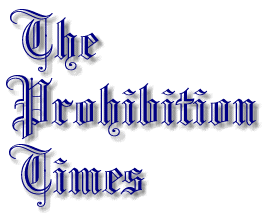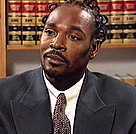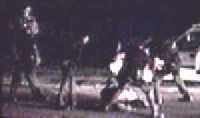VIOLATION OF FEDERAL CIVIL RIGHTS: "RODNEY" GLENN KING AND THE WORLD'S MOST VIOLENT DWI ARRESTby John LeeCan we get along? --Glenn King One infamous alleged-DWI traffic stop resulted in 54 deaths, 7,000 arrests, one billion dollars in property damage and a permanent stain to America's self-image and international credibility. However, in this case, the police violence was documented on videotape, and resulted in successful criminal prosecution of the offending cops, and millions of dollars in civil penalties awarded to the victim (and to his lawyers). The American Civil Liberties Union (ACLU) even distributed free Bustcards in response to this particular case of police abuse.
This DWI traffic stop involved nearly two-dozen police and a paroled citizen by the name of "Rodney" Glenn King. Glenn did not use the name "Rodney" -- what else did the media fail to report? King's previous criminal activities had included a ticket for offering a transvestite police officer $5 for sex. Another much-publicized arrest of King was for alleged robbery after an old man successfully defended himself from King's armed assault with Moon Pies. Around midnight on March 3rd, 1991, Mr. King and a couple of friends were out riding around Los Angeles, in the neighborhood where Arnold Schwarzenegger had just filmed The Terminator, a movie where a mechanical assassin walked into a police station and killed all the cops. (The Hollywood star's real-life father was a Nazi cop during World War II, so perhaps the actor was tapping into some personal emotions of anti-police animosity.) King drove down the freeway while a California Highway Patrol car was using an exit ramp. The CHP troopers, a husband and wife training team, felt that this citizen behind them deserved a speeding ticket, even though he had not been clocked at any particular speed (remember that Ralph Nader in Unsafe at Any Speed, the Designed-In Dangers of the American Automobile and David Soloman of the Federal Highway Administration say that speeding is six times safer than driving the speed limit). However, Mr. King did not concur, since he feared a DWI arrest would send him back to prison (he could not afford a non-government defense lawyer, and instinctively knew he had no chance of a fair government trial). He "led" them on a short "high-speed" Interstate highway chase -- at speeds of 50 mph. King even stopped for a traffic light, according to the cops. Trainee trooper Melanie Singer confessed to droving at speeds in excess of 100 miles-per-hour on the city streets (or claimed to), chasing Mr. King's 1988 Korean Hyundai Excell (arguably the cheapest and slowest car sold in America) -- which had a theoretical top speed of 80 mph (assuming it never had to slow down for turns, hills, headwinds, stoplights, etc.). A couple of minutes later, after attaining a maximum speed of 50 mph off the freeway and stopping for traffic lights, King pulled over for police. Within minutes, there were 21 officers, including at least two females, and one helicopter on the scene -- apparently there had been no other crimes to solve that evening. Tim and Melanie Singer, the married CHP officers who had wanted to profit by writing Mr. King a speeding ticket without bothering to measure his speed, ordered Mr. King and friends out of their car at gunpoint. At this point, Mr. King committed the crime of being nervous and playful -- "contempt of cop". After placing both hands on top of his car, he looked up at the helicopter and waved. The female trooper ordered him to put his hands behind his back to be handcuffed. Instead, he defiantly grabbed the seat of his pants. (Mr. King's I.Q. was only 84, placing him into the "retarded" intelligence category.) At this point, Officer Laurence Powell of the LAPD walked up and ordered the CHP trainee cop to "stop, we'll take care of this." According to Trooper Melanie Singer, Powell gave NO command to Mr. King. Instead, Powell fired his Taser gun, striking the alleged speeder with 50,000-volts of lightning from the metal darts. Due to the sudden extreme pain (which can cause death by heart attack -- King did suffer four heart attacks in the next few days), the startled Mr. King attempted to run away. Tasers do not cause citizens to remain still, they cause citizens to jump. (Try grabbing hold of a 40,000-volt spark plug wire on a vehicle's engine, and see what happens to your hand. Trust me, your hand will fly of its own free will. New police electrocution devices can exceed 100,000 volts, and can be permanantly strapped to incarcerated prisoners and switched on by remote control.)
Mr. Powell then swung his metal PR-24 baton in a "powerstroke"--like swinging a baseball bat at full power, hitting Mr. King in the face. It is against LAPD regulations to hit a citizen in the head, since this can easily cause instant death. (Powell had just been given extra baton instruction from Sgt. Stacy Koon earlier that evening, because he had not been hitting hard enough.) Blood spurted out of Mr. King's head wound, and he fell to the ground, face first. Powell kept on hitting Mr. King, while he was down. Another LAPD cop, Theodore Briseno, attempted to stop Officer Powell, by reaching out to grab his arm. LAPD rookie officer Timothy Wind also joined in the "swarm" (team takedown) with Powell. The church-going Koon supervised, ordering his troops to beat King into submission, and also fired his Taser. In an 81 second period, Mr. King withstood 45 powerstrokes from Powell's metal baton, mainly to the head but also to his wrists, elbows, knees and ankles, and 15 powerstrokes and kicks from Wind. Mr. King never defended himself, and never yelled at the cops. The cops, however, were screaming so loudly they could be heard over the noise from the circling police helicopter. It looked like they were killing him -- certainly most people would have died under such an extreme assault. Luckily, King's size perhaps saved his life, though he was the same size or smaller than most of the cops surrounding him. King was not very strong. He once robbed a Korean convenience store with a tire wrench, but the tiny middle-aged store clerk took the weapon away from him. King had to resort to throwing snack pies at the fearless cashier.
The other 17 cops just stood by and watched. Trooper Melanie Singer later testified, "There was no reason for the assault. How can [Powell] do this? I knew it was against CHP policy to strike someone in the head. I knew results could be deadly. I just knew it was wrong." LAPD officer Timothy Briseno later testified, "I thought Officer Powell was out of control then. [I tried to] stop Officer Powell. . . . It didn't make any sense to me. I couldn't see why they were doing what they were doing." One of King's passengers--who had also allegedly been beaten after being taken into custody -- testified to hearing his friend's "bones cracking" and listening to screams of pain. King testified that the TAZER electrocutions lasted about five seconds each, and that eventually he was so numb from the beating he could not feel any pain. King told the D.A.'s investigators: "Shit, I know I was getting my ass kicked by about five [cops]. I watched the rest of them come, and I watched the rest of them sit around this whole, it looked like a big block to me. It was a fucking block party was what it looked like to me. I could see them all around. And I'm wondering, like, damn, why don't somebody stop them? Why don't one of these guys stop them and I could see them all around kinda' like smiling, looking at me like I was, like I was real shit, man, and then somebody walked over to me and laughed, after I was on the ground and down on the ground somebody walked over to me. Okay, well I layed down, face down. . . . I could see them walking over to me. . . boom, kicked me in the face, and then I heard, uh, we're going to kill you nigger. . . . I had no intention of running when, until he, uh, until I heard that." Apparently, when King did not die instantly, the officers only stopped their assault out of fatigue. After seven police officers got up the courage to handcuff and hog-tie Mr. King, they dragged him to the side of the dark road and left him face down in the dirt. Mr. King had nine skull fractures, a severe concussion (swelling of the brain), his sinus bones were broken, a shattered eye socket, broken teeth, paralysis of the face, internal bleeding, numerous cuts and bruises, and he had a broken leg.
Powell, high on rage, adrenalin and endorphines, typed into his police computer, "I haven't beaten anyone this bad in a long time. Ha. Ha. Numerous head wounds. Ha. Ha. Just had a big-time use of force." Powell later testified this kind of talk is simply standard jargon for all police officers. Powell's previous computer message on a police call that night was: "It was almost as exciting as 'Gorillas in the Mist' [the movie]. The police dispatcher replied, "Ha. Ha. Ha. Let me guess who be tha parties?" (Powell's previous call had also involved a family of people who were of a different ethnic background from himself.) At the emergency room, according to two nurses, Powell taunted the stunned, concussed and paralyzed Mr. King, who was by now understandably in a severe state of shock: "We played a little ball tonight, didn't we? We won. You lost. We hit quite a few home runs." Mr. King slowly responded, "Yeah, you guys did have a pretty good game tonight." LAPD Officers Powell, Wind, Koon and Briseno were arrested and charged with the crimes of assault with a deadly weapon, excessive use of force and filing false reports. Briseno appeared to kick Mr. King one time, though he alleged it was to protect King from Powell. It looked more like he just eventually got frustrated with trying to do good, and decided to take it out on the one person who appeared unable to harm him. It was simpler, easier and safer to kick a fallen citizen than to fight a cop. But at least he tried, which is more than anyone else did. Maybe if more cops had stood up for the law, things could have turned out differently. In the resulting riots after the television broadcast of the famous videotape, 54 lives were lost, a billion dollars in real estate was destroyed, and the United States was (yet again) seen by the world community as the hypocritical "champion" of civil rights that it is. The corrupt cops' LAPD commander testified that the theory of "escalation/de-escalation" is a way of describing to police officers how to use the minimum level of force possible. The commander testified that his cops broke LAPD regulations and broke the law against excessive force. Officer Briseno stated: "I was upset with the sergeant [Stacy Koon]. The god-damned Sarge should've handled this a lot different. He should've handled it a lot better and should have his ass reamed." Prosecutor Terry White asked Officer Briseno: "Did you see any movement [from Mr. King] that could have been described as threatening?"
Judge Stanley Wiseberg tried the case in Semi Valley, after the criminal lawyers begged that their corrupt clients could not find any fair jurors out of the millions of citizens of the city of Los Angeles. During the trial, neither the rookie cop Wind nor Mr. King testified. Prosecutors decided Mr. King had suffered enough abuse already, and didn't feel he deserved to be beaten up by the four criminal attorneys -- like a rape victim that gets raked over the coals for the audacity of prosecuting the rapist. The criminal lawyers used the strategy of "freeze framing" the blurred videotape, which eliminated all appearance of violence from the horrendous spectacle. After seven days of deliberations, the jury -- none of whom were the same ethnic origin as Mr. King, returned verdicts of "not guilty," on April 29, 1992. Public outrage over this governmental injustice led to America's worst riots of the 20th Century. For a complete viewing of this infamous DWI case, see the Court TV broadcast, "The 'Rodney King' Case: What the Jury Saw in California v. Powell, [et. al]." This was an alleged DWI case, with Mr. King allegedly high on PCP amphetimines and alcohol. However, Mr. King was not on drugs, and his alleged 0.19 %BAC level was probably due to a false reading because of the time delay or internal injuries (no lawyer was ever given the opportunity to dispute this allegeation); his behavior was simply less than bright. That is simply the way that Mr. King always looks, behaves and speaks when sober. Just another case of an alleged violation of a routine traffic regulation turning into a tragedy for the entire world. By revealing Mr. King's prior arrest record, the police and media attempted to justify attempted murder via police brutality as a suitable punishment for contempt of cop. If it hadn't been for citizen George Holliday trying out his new video camcorder, Rodney King would have simply been another DWI statistic. Despite his injuries, the district attorney's office would have prosecuted him for DWI with the full force of the government. He would not have gotten a trial by jury, nor would he have been allowed to change venue to seek a more forgiving court. No one would have cared. No one would have rioted over a "routine" DWI and "resisting arrest" conviction. Thanks to Holliday, Mr. King not only avoided a long prison sentence, he received $3.4 million in a civil lawsuit against the government of Los Angeles, and his lawyers received an additional $1 million in attorney fees. Here are some of the laws that protect citizens, when they choose to stand up for themselves in court by suing corrupt police officers: 42 USC 1983. Civil Rights Act - Police Action. Of interest in this regard is Pennsylvania v Porter (1979, WD Pa) 480 F Supp 686, affirmed in part and reviewed in part on other grounds (CA3 Pa) 659 F2d 306, in which the court said that the application of force during an arrest by a police officer that exceeds that which is reasonable and necessary under the circumstances and also violates standards of decency more or less universally accepted amounts to cruel and unusual punishment under 42 USCA 1983. Being found "innocent" of a DWI charge, after a long drawn out jury trial, is not a valid legal reason to sue. It must be an illegal arrest first. 1 ALR 519 Civil Rights Act - Police Action7. Defenses; probable cause It has been held that police action in connection with an arrest does not give rise to a cause of action under 42 USC 1983 where there was probable cause for the arrest and the arresting officer acted in good faith, even though the arrested person was subsequently found innocent of the charge on which he was arrested. In a civil case, the accused police officers do not have a right to avoid giving testimony. Also, the burden of proof is lower. Criminal cases require "proof beyond a reasonable doubt," which is not proof beyond any doubt, but still a relatively high standard to prove without any witnesses to testify about what actually happened. Civil cases require "preponderance of the evidence," which is anything over 51 percent, making victory in this case a virtual certainty. These are some basic ideas regarding a citizen's legal rights. It is important for a motorist to have a basic understanding of these rights, since the government's heavily-armed employees usually get away with their crimes, simply due to ignorance of the law by their victims -- and due to the lack of video cameras. It may be wise to consult an attorney who specializes in civil rights law, as opposed to a typical trial lawyer, who may not even believe in civil rights. Unfortunately, it took a billion dollars in riot damage, and dozens of deaths, for the citizens of Los Angeles to get rid of five corrupt cops. Citizens of most communities are not normally prepared to make such an effort to police their police. However, intelligent use of the current laws can enable millions of citizens to stand their ground against criminals working for the government. |
DEEP THOUGHTSCan we get along? JOKE OF THE DAYEverybody remember Zsa Zsa Gabor slapping that Beverly Hills cop and ending up in jail? |






